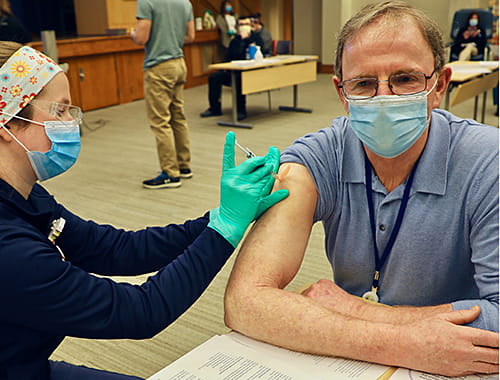Cincinnati Children’s Require COVID-19 Vaccine for Employees, Other Workers
All employees and others who work at Cincinnati Children's must be vaccinated against COVID-19.
Why is Cincinnati Children’s requiring employees and others who work at the medical center to be vaccinated?
Safety is our foundational responsibility. Vaccination protects patients, families, and our workforce and provides further reassurance that it is safe for our community to seek the healthcare they need. Our hospitals are already safe to visit because of infection prevention and control measures, which include masking, distancing, handwashing, and cleaning. We believe that in addition to such measures, the best way to keep our patients, families, and employees safe from COVID-19 is through vaccination.
Who at Cincinnati Children’s is required to get a COVID-19 vaccination?
Proof of vaccination is required of all Cincinnati Children’s employees. Contractors, volunteers, vendors and students who work onsite at any of the medical center’s facilities also must be vaccinated. Exemptions for the COVID-19 vaccination requirement may be granted for approved medical contraindications or religious prohibitions.
Are booster shots required for Cincinnati Children’s employees?
Boosters are not required for employees at this time, but are recommended for those employees who are eligible.

Robert Frenck, MD, director of the Vaccine Research Center at Cincinnati Children's, shared an image with employees as he received his COVID-19 shot earlier this year.
Why is vaccination so important?
We still have many patients who are not immunized because they are too young to be eligible for COVID-19 vaccination under current FDA rules. In addition, evidence has shown that when infected, people who were vaccinated had much less severe disease, and were much less likely to be hospitalized than those who were not. Prolonged absences of employees could jeopardize staffing necessary to care for patients.
What practices has Cincinnati Children’s already adopted to protect patients, families, and employees from COVID-19?
In addition to employee vaccination, Cincinnati Children’s follows infection-prevention and control practices designed to protect everyone, including those too young to be eligible for COVID-19 vaccination. These practices include masking, distancing, frequent hand washing, daily self-screening by employees, and avoiding working on-site while ill. No single safety precaution is 100% effective against COVID-19, but in combination these practices offer significant protection.
Why do non-employees who work at Cincinnati Children’s need to be vaccinated?
Anyone who works in the medical center has an obligation to safeguard the patients, families, employees and others at Cincinnati Children’s.
How many employees does Cincinnati Children’s have, and who do they care for?
Cincinnati Children’s employs 16,600 people, making it the largest hospital system and second-largest workforce in the region. The hospital’s 1.48 million patient encounters in Fiscal Year 2021 benefited local children as well as kids from all 50 states and 51 countries, including those treated for complex or rare disorders. Many of those patients are too young to be eligible for COVID-19 vaccination.
Can COVID-19 vaccines protect against COVID-19 variants?
Yes, the existing vaccines can protect against severe illness, hospitalization and death caused by new strains of COVID-19 variants such as Delta and Omicron.
How can workers at Cincinnati Children’s get vaccinated against COVID-19?
Employees and other workers may get vaccinated at other community sites, such as pharmacies, doctors’ offices, and clinics.
How does Cincinnati Children’s know COVID-19 vaccines are safe and effective?
Over half a billion doses of COVID-19 vaccine have been safely administered in the United States. That equates to about two-thirds of the people in the country being fully vaccinated, and about 79% having received at least one dose. Our medical experts at Cincinnati Children’s, including those overseeing clinical trials of COVID-19 vaccines, indicate that the vaccines can’t give you the disease, don’t affect your DNA, don’t contain stem cells, and don’t affect fertility. In addition, nearly all people in the U.S. now hospitalized with COVID-19 are unvaccinated or not fully vaccinated, which indicates the effectiveness of the vaccine in preventing severe illness.
How did Cincinnati Children’s contribute to the development of the COVID-19 vaccine?
Cincinnati Children’s was among the first medical centers in the nation to evaluate COVID-19 vaccines through clinical trials involving adults and children, which have demonstrated the safety and effectiveness of these vaccines. More than 1,400 people, ranging in age from 6 months to 86 years old, have participated in these studies at Cincinnati Children’s. Numerous scientists, physicians, nurses, pharmacists, data managers and others are involved in vaccine research at Cincinnati Children’s. Robert Frenck, MD, director of the Gamble Vaccine Research Center at Cincinnati Children’s, is the principal site investigator for the study of the Pfizer/BioNTech COVID-19 vaccine (now authorized for those 12 or older) as well as the AstraZeneca vaccine. Cincinnati Children’s is also conducting clinical trials involving the Moderna vaccine.
How can I find out more about COVID-19 and vaccines?
For more information about COVID-19 and vaccines, visit the Vaccine Resources website of Cincinnati Children’s.



